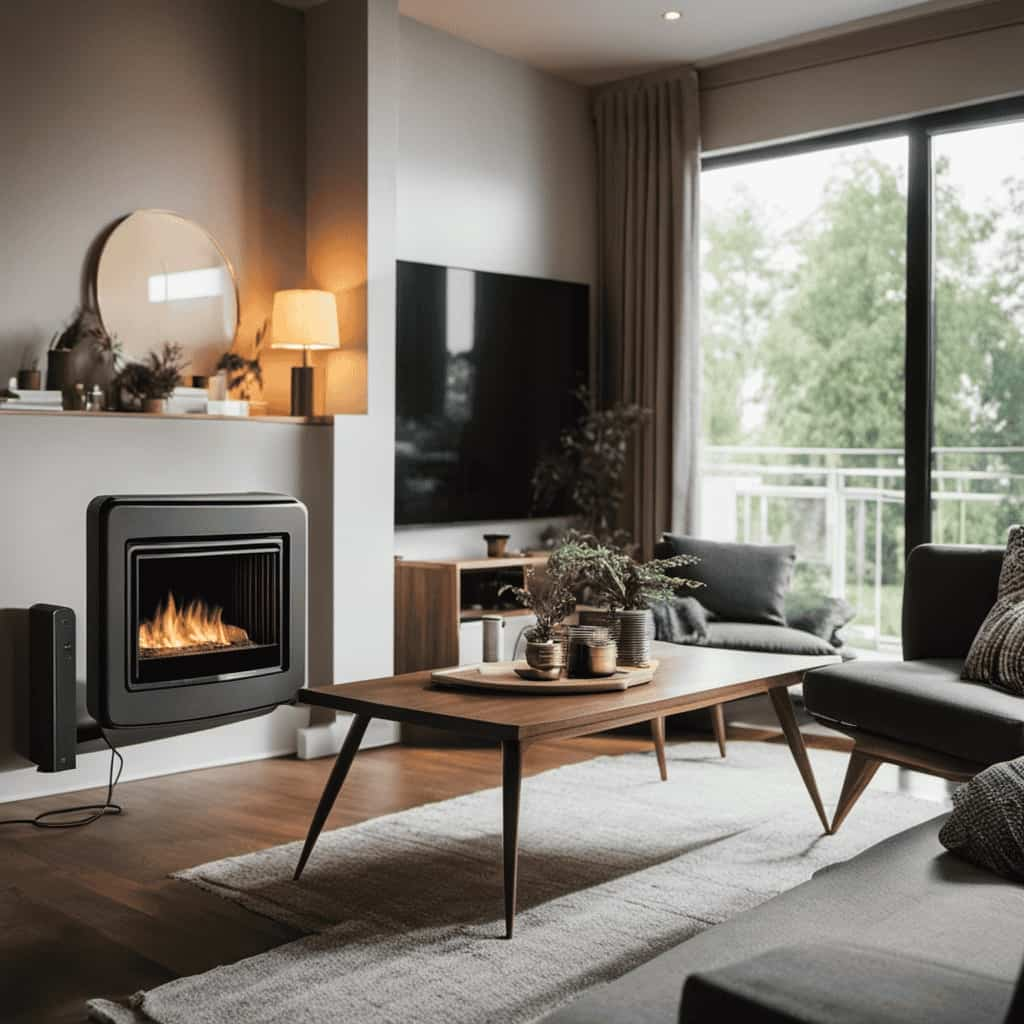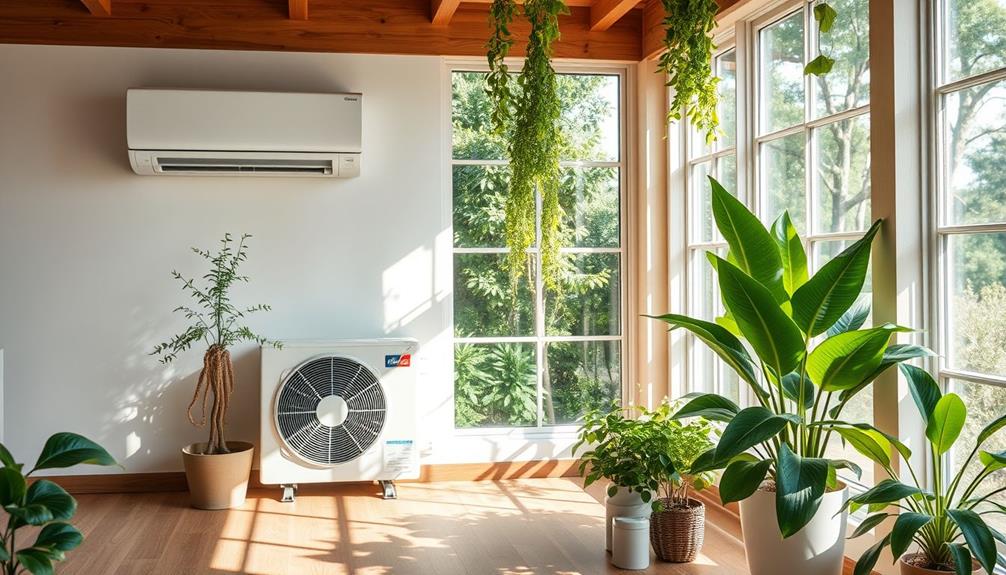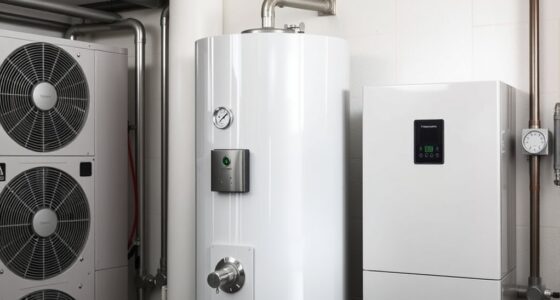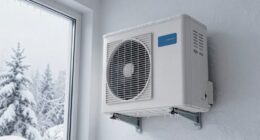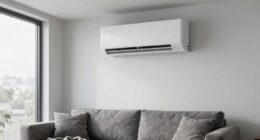Discover the ultimate resource for energy-efficient home heating with our comprehensive guide to heat pumps.
Get ready to be blown away by the incredible efficiency and cost savings these devices can bring to your home.
From understanding how heat pumps work to choosing the right type for your needs, we’ve got you covered.
Plus, we’ll share tips on maximizing energy efficiency and keeping your heat pump running smoothly.

Say goodbye to high heating bills and hello to a cozy, eco-friendly home.
Let’s dive in!
Key Takeaways
- Heat pumps transfer heat from the outside to the inside of your home by extracting heat from the air or ground.
- Heat pumps provide efficient and cost-effective heating, achieving energy savings of up to 40% compared to electric resistance heating.
- Heat pumps have a lower environmental impact than fossil fuel-based systems, as they don’t produce greenhouse gas emissions during operation.
- When choosing a heat pump, consider factors such as high energy efficiency ratings, sizing the heat pump correctly for your home, and consulting with a professional HVAC contractor for guidance.
How Do Heat Pumps Work
We’ll explain how heat pumps work to efficiently heat your home.
Heat pump technology is designed to provide energy-efficient heating by transferring heat from the outside to the inside of your home. Unlike traditional heating systems that generate heat, heat pumps extract heat from the air or ground and use it to warm your living spaces.
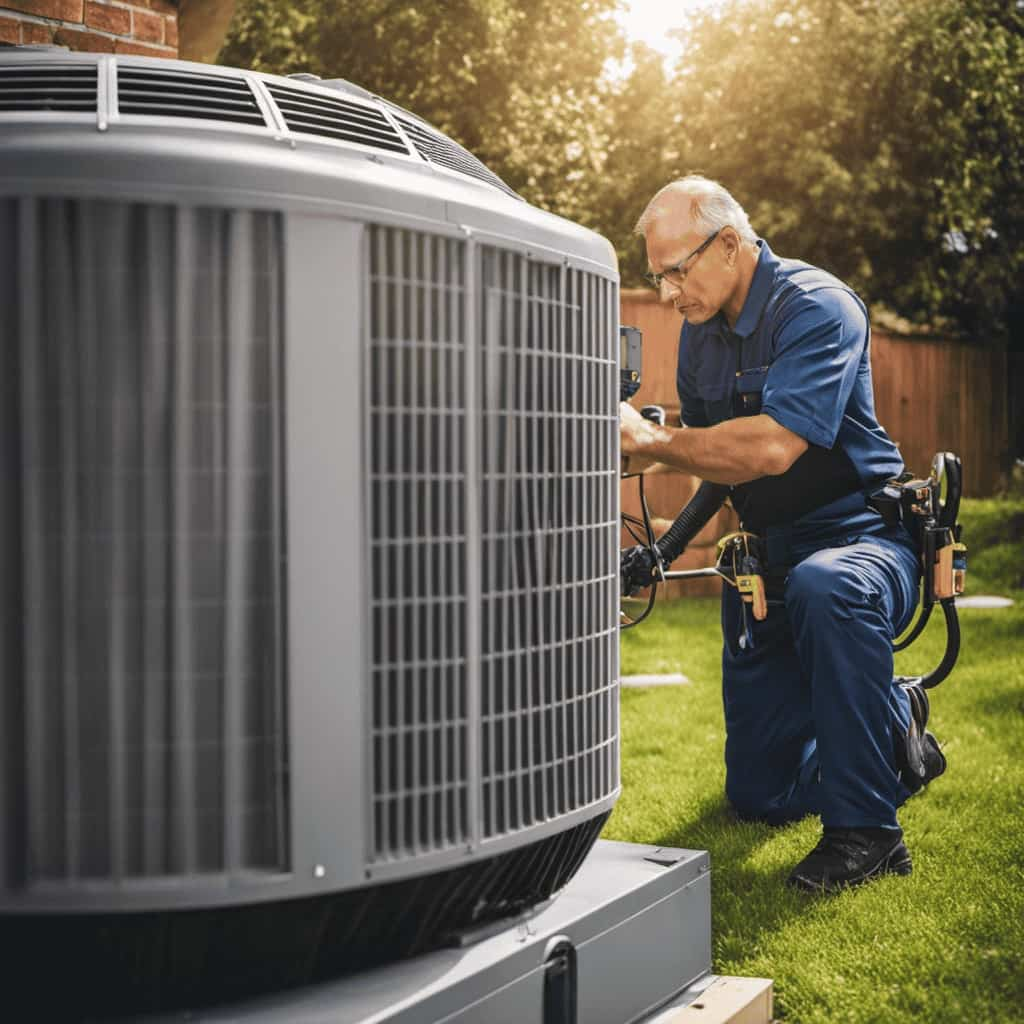
This process is made possible by the refrigerant circulating through the system, absorbing heat from the outdoor air or ground and releasing it indoors. Heat pump efficiency is achieved through the use of advanced compressor technology and intelligent controls that optimize performance.
By harnessing renewable heat sources, heat pumps offer a sustainable and cost-effective solution for home heating.
Now that we understand how heat pumps work, let’s explore the different types of heat pumps available.
Types of Heat Pumps
Let’s explore the different types of heat pumps available for energy-efficient home heating.

Heat pumps are a great alternative to traditional heaters, as they provide both heating and cooling capabilities. Here are two main types of heat pumps:
- Air-source heat pumps:
- This type of heat pump extracts heat from the outdoor air and transfers it indoors to heat your home.
- Air-source heat pumps are more affordable compared to other types, making them a cost-effective option.
- Ground-source heat pumps:
- Also known as geothermal heat pumps, these systems extract heat from the ground and transfer it to your home.
- Ground-source heat pumps are highly efficient and can provide substantial energy savings in the long run, although they’ve higher upfront costs.
When comparing the cost of different types of heat pumps, it’s important to consider the initial investment, operating costs, and potential energy savings. Consulting with a professional can help you determine the most suitable heat pump for your home, ensuring optimal energy efficiency and cost-effectiveness.
Benefits of Heat Pumps for Home Heating
One of the benefits of heat pumps for home heating is their ability to provide efficient and cost-effective heating throughout the year. Heat pumps are designed to transfer heat from one place to another, rather than generating heat themselves. This makes them highly energy-efficient compared to traditional heating systems.
Heat pumps can achieve energy savings of up to 40% compared to electric resistance heating. They work by extracting heat from the outside air, ground, or water and transferring it into the home. This process requires less energy input, resulting in lower energy bills for homeowners.
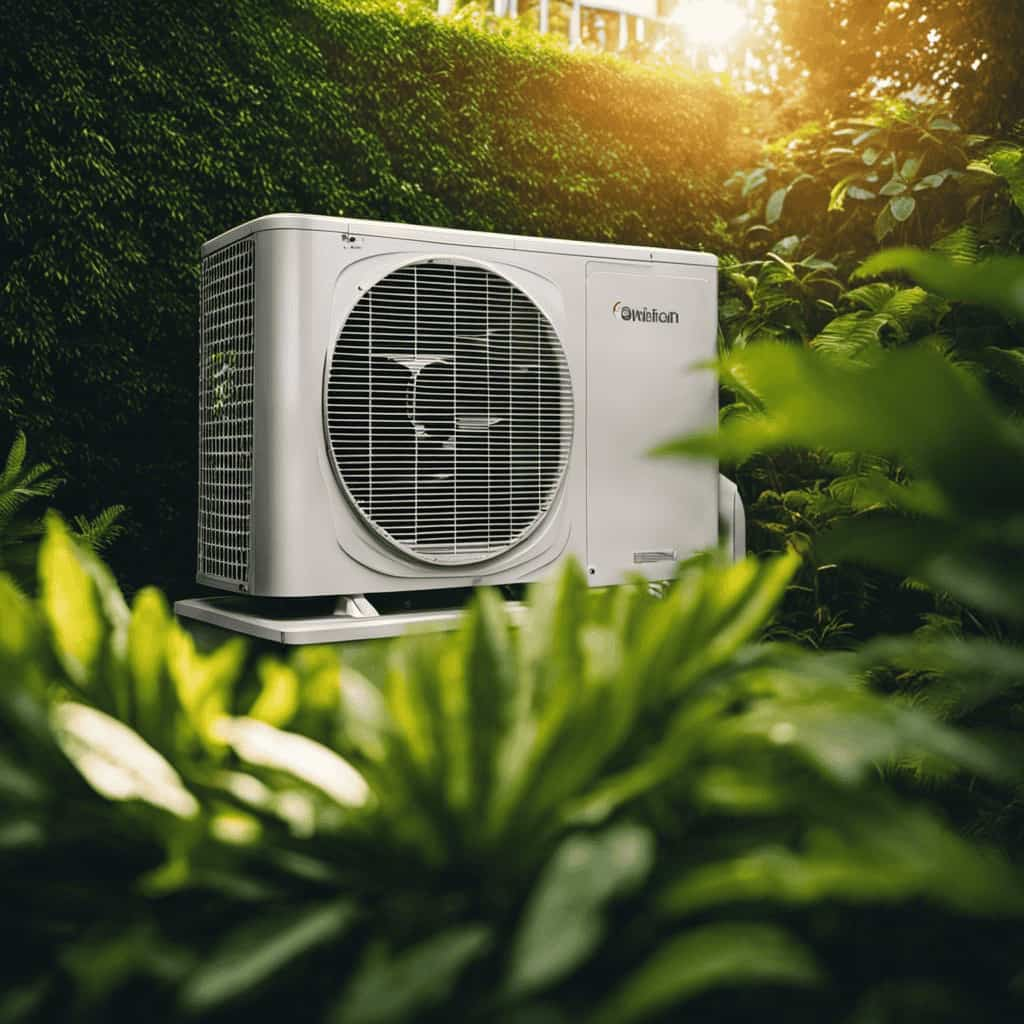
Additionally, heat pumps have a lower environmental impact compared to fossil fuel-based heating systems, as they don’t produce greenhouse gas emissions during operation. By choosing a heat pump for home heating, homeowners can enjoy both energy savings and contribute to a greener future.
Factors to Consider When Choosing a Heat Pump
When considering a heat pump for our home, there are several factors to take into account in order to make an informed decision. Here are the key factors to consider:
-
Energy Efficiency Ratings:
-
Look for a heat pump with a high Seasonal Energy Efficiency Ratio (SEER) for cooling and a high Heating Seasonal Performance Factor (HSPF) for heating. Higher ratings indicate better energy efficiency and lower operating costs.
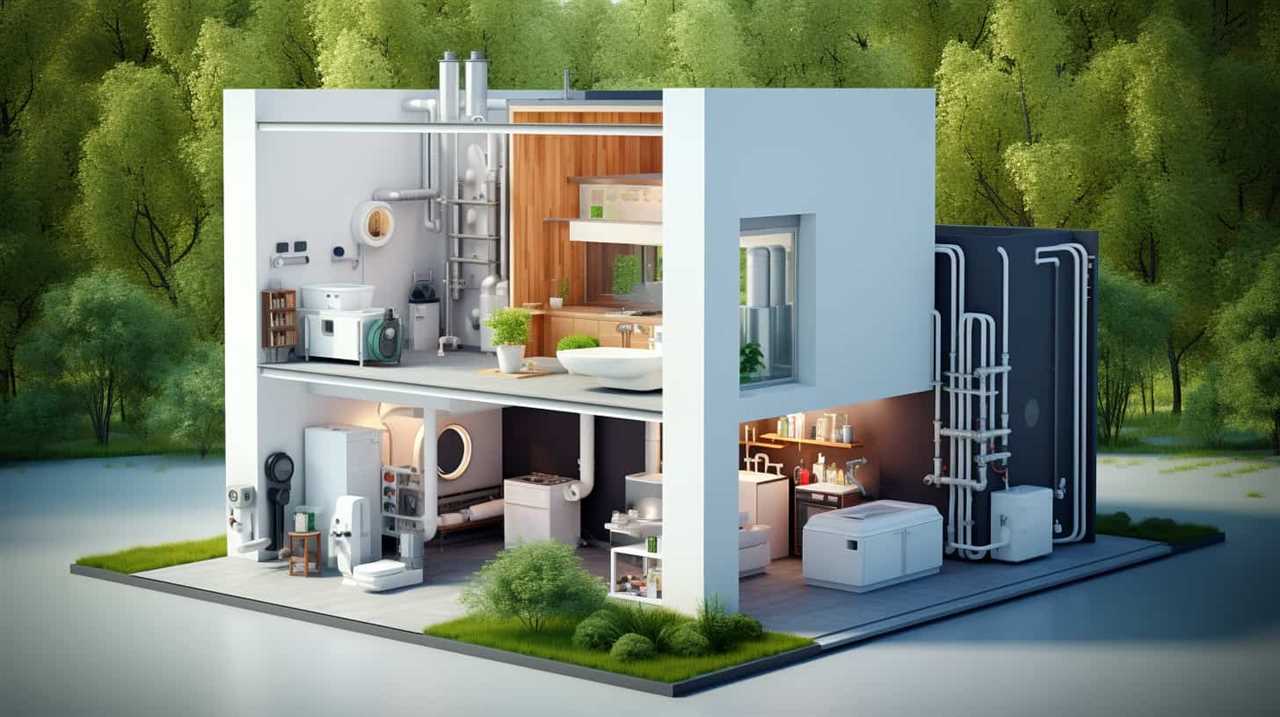
-
Consider heat pumps with the ENERGY STAR label, as they meet strict energy efficiency guidelines set by the Environmental Protection Agency.
-
Sizing Considerations:
-
Ensure the heat pump is sized correctly for your home. A professional HVAC contractor can perform a Manual J load calculation to determine the appropriate size based on factors such as insulation, square footage, and climate.
-
Oversized or undersized heat pumps can lead to inefficient operation, increased energy consumption, and discomfort.

Installation and Maintenance of Heat Pumps
When it comes to the installation of heat pumps, proper techniques must be followed to ensure optimal performance and efficiency. This includes selecting the right location, sizing the unit correctly, and ensuring proper airflow and insulation.
Regular maintenance is also crucial to keep the heat pump in good working condition. This involves tasks such as cleaning or replacing filters, checking refrigerant levels, and inspecting electrical connections.
Proper Installation Techniques
To ensure the efficient operation of our heat pumps, it’s crucial to follow proper installation techniques and regularly maintain them. Proper installation techniques are essential for maximizing the performance and lifespan of heat pumps. Here are some key steps to consider during installation:
- Site selection: Choose a location that provides adequate airflow and is free from obstructions such as trees or shrubs.
- Sizing: Properly size the heat pump to match the heating and cooling requirements of the space.
- Ductwork: Ensure that the ductwork is properly sized and sealed to prevent air leakage.
Additionally, regular maintenance is necessary to keep heat pumps running smoothly. Maintenance requirements include:

- Regular filter cleaning or replacement to maintain airflow and efficiency.
- Annual professional inspections to check for refrigerant leaks, electrical connections, and overall system performance.
By following these proper installation techniques and maintenance requirements, you can ensure optimal performance and longevity of your heat pump system.
Now, let’s dive into the regular maintenance requirements in more detail.
Regular Maintenance Requirements
We should regularly perform maintenance on our heat pumps in order to ensure their efficient operation and longevity. Following a maintenance checklist can help identify and address any issues before they become major problems.
One important task is to clean or replace the air filters every few months to ensure proper airflow. Additionally, checking and cleaning the outdoor unit regularly can prevent debris from obstructing the airflow and affecting the heat pump’s performance.
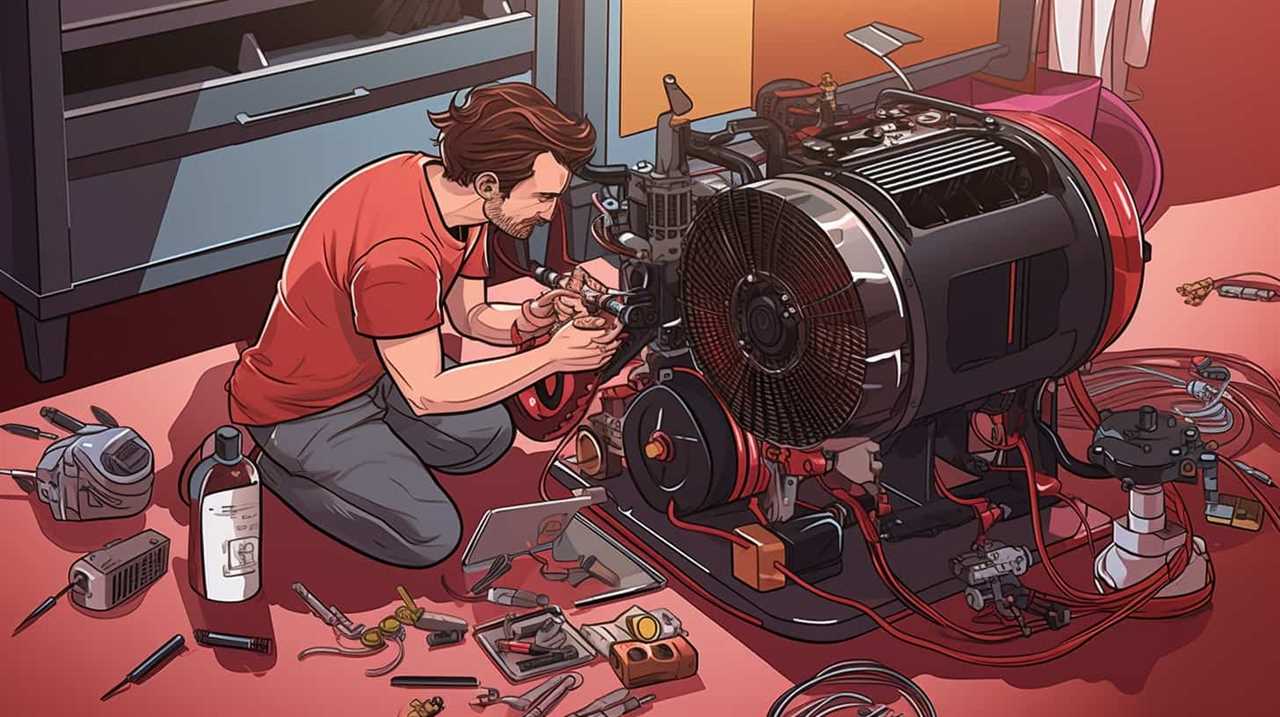
It’s also crucial to inspect the refrigerant levels and electrical connections, as well as lubricate the motor and other moving parts as needed. In case of any issues, troubleshooting tips can help diagnose common problems like insufficient heating or cooling, unusual noises, or frequent cycling.
By performing regular maintenance and addressing any issues promptly, we can ensure that our heat pumps operate efficiently and last for many years.
Transitioning into the next section, let’s now explore some tips for maximizing energy efficiency with heat pumps.
Tips for Maximizing Energy Efficiency With Heat Pumps
When it comes to maximizing energy efficiency with heat pumps, there are several key points to keep in mind.
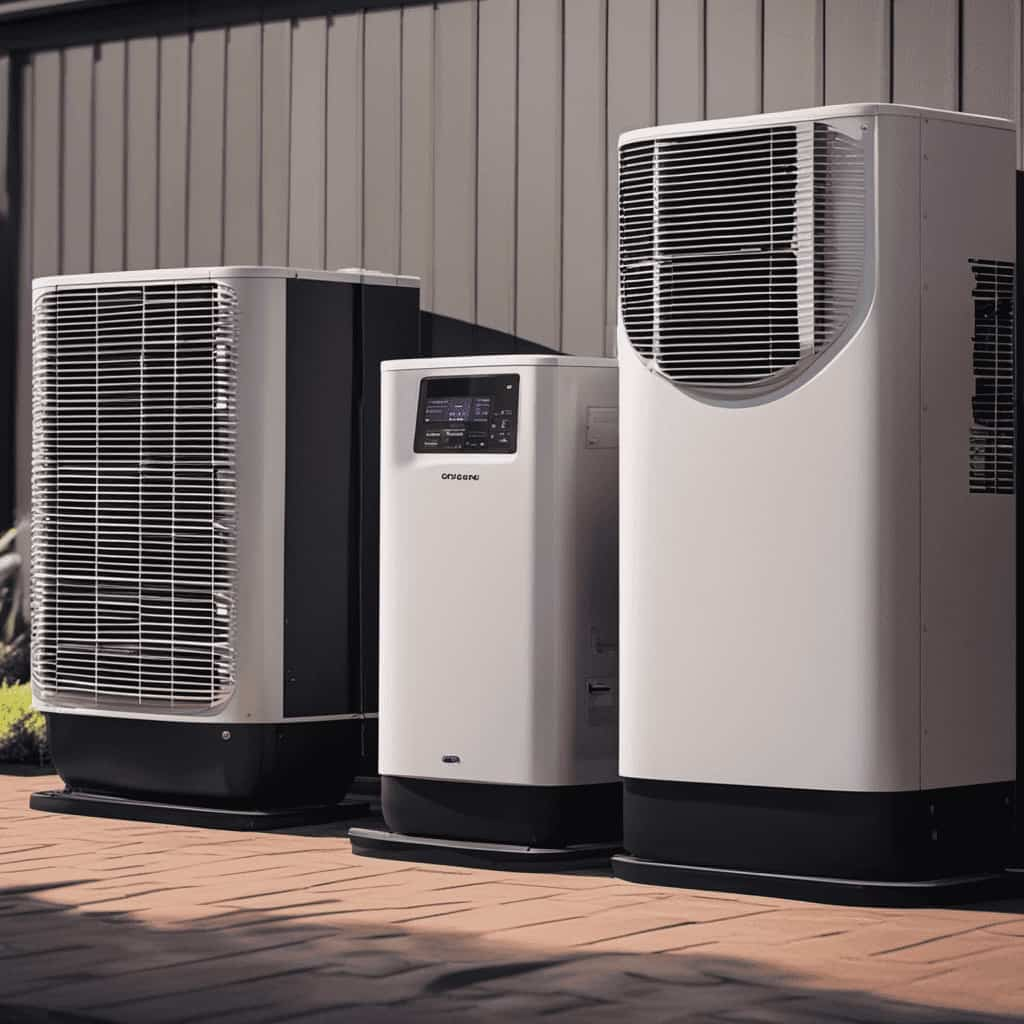
First, setting the temperature at an optimal level can greatly improve efficiency.
Regular maintenance and servicing of the heat pump is also crucial for ensuring its peak performance.
Additionally, proper insulation of the home can help minimize energy loss and maximize the efficiency of the heat pump.
Temperature Settings for Efficiency
One simple tip for maximizing energy efficiency with heat pumps is to set the temperature no higher than 68 degrees Fahrenheit. By following this recommendation, you can save energy and reduce your heating costs.
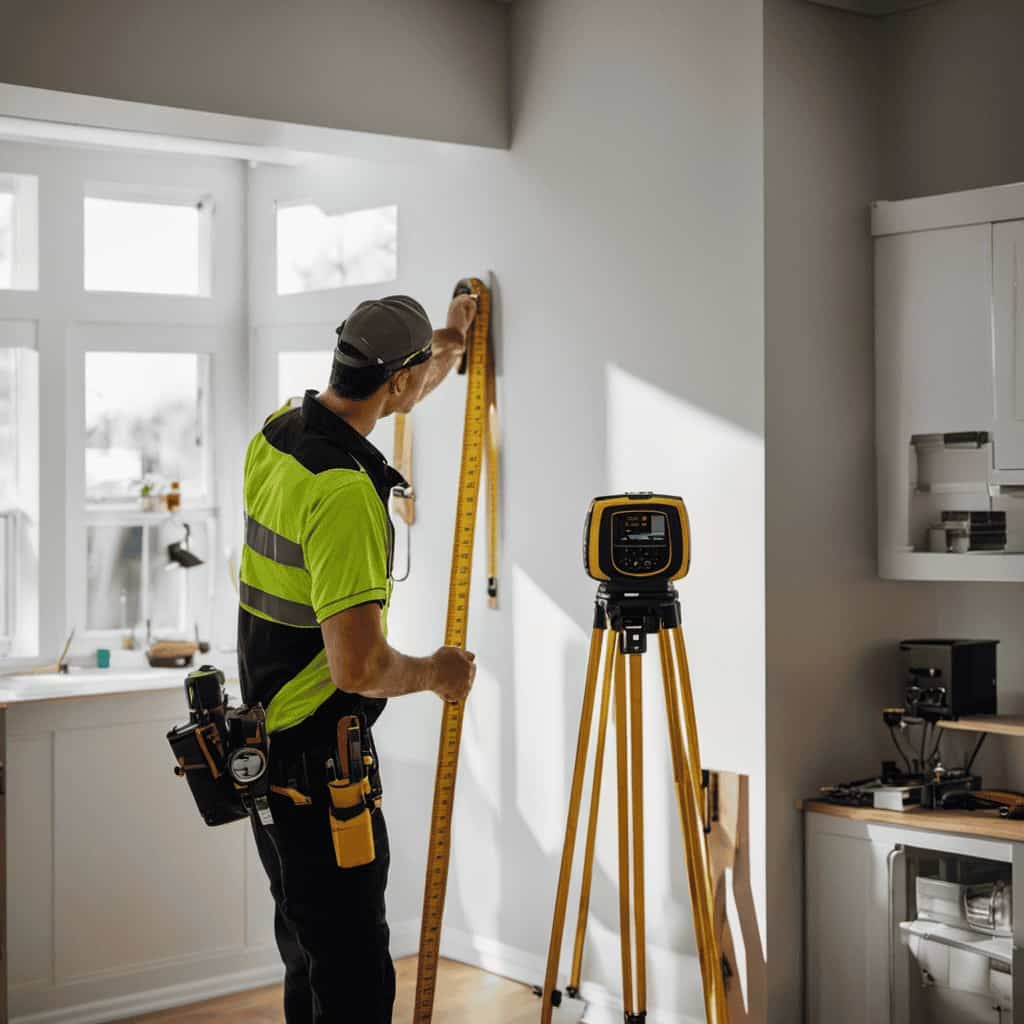
Here are some energy-saving tips and setting recommendations to help you further optimize the efficiency of your heat pump:
-
Use a programmable thermostat to adjust the temperature based on your schedule. Set it lower when you’re away or sleeping and higher when you’re at home and awake.
-
Consider using zone heating, which allows you to heat specific areas of your home instead of the entire space. This can help save energy by avoiding unnecessary heating.
-
Regularly clean and maintain your heat pump to ensure its optimal performance. This includes cleaning or replacing air filters, checking for any leaks, and scheduling professional maintenance as needed.
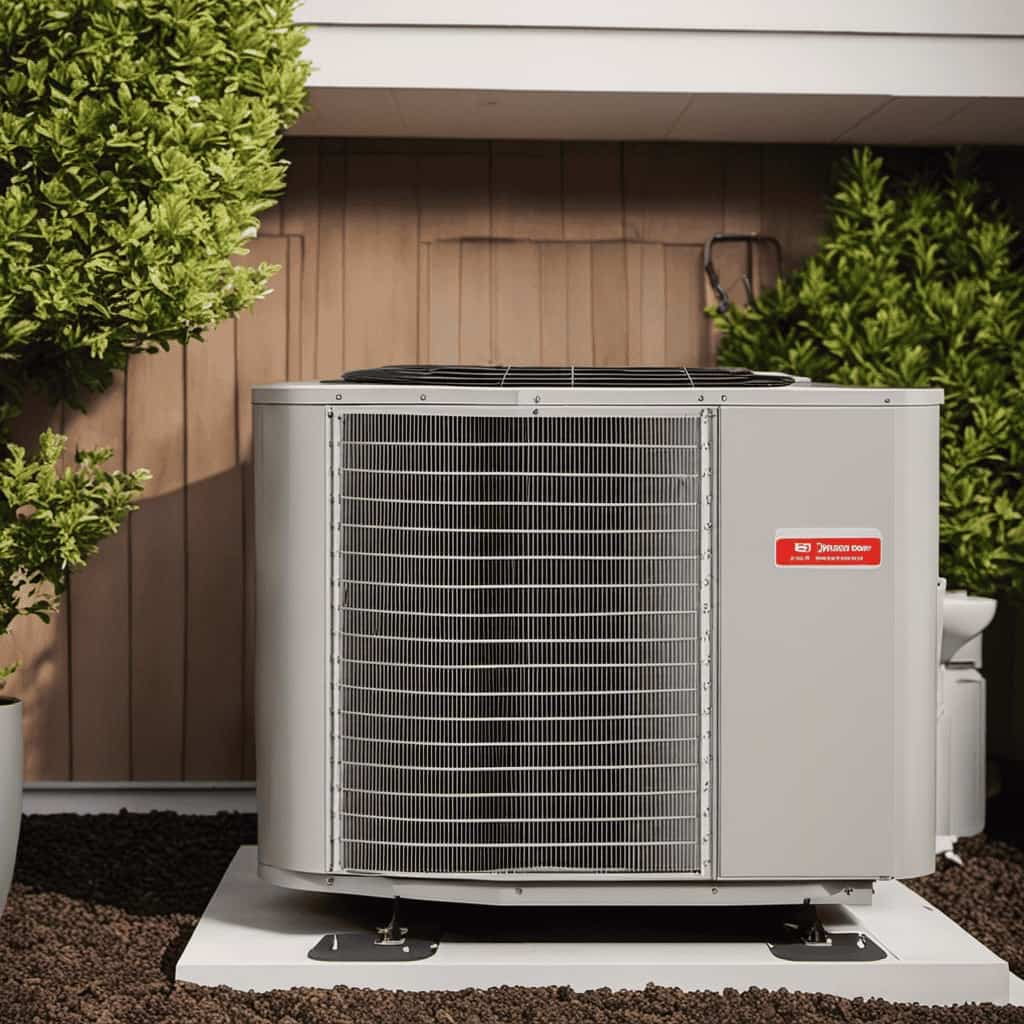
Regular Maintenance and Servicing
To ensure maximum energy efficiency with heat pumps, regularly clean and service your unit. Proper maintenance is crucial for the smooth operation of your heat pump and to avoid any potential issues that could impact its efficiency. Establishing a maintenance schedule is essential to stay on top of routine tasks.
Regularly check and clean the air filters, as clogged filters can reduce airflow and strain the system. Inspect the outdoor unit for debris and remove any obstructions. Additionally, ensure that the coils are clean and free of dirt or dust buildup. Lubricate the moving parts to reduce friction and ensure smooth operation.
In case of any issues, refer to troubleshooting tips provided by the manufacturer or consult with a professional technician to address the problem promptly. By following these maintenance and servicing guidelines, you can maximize the energy efficiency of your heat pump and extend its lifespan.
Insulation for Optimal Performance
Our heat pump’s energy efficiency can be maximized through proper insulation for optimal performance. Insulation plays a crucial role in minimizing heat loss and ensuring that the heat pump operates at its highest efficiency. Here are some energy-saving techniques and insulation materials that can significantly improve the performance of your heat pump:

-
Insulation materials:
-
Fiberglass: This common insulation material is affordable and easy to install. It effectively traps air pockets, reducing heat transfer.
-
Spray foam: This expanding foam fills gaps and cracks, providing an airtight seal and preventing heat loss.
-
Energy-saving techniques:
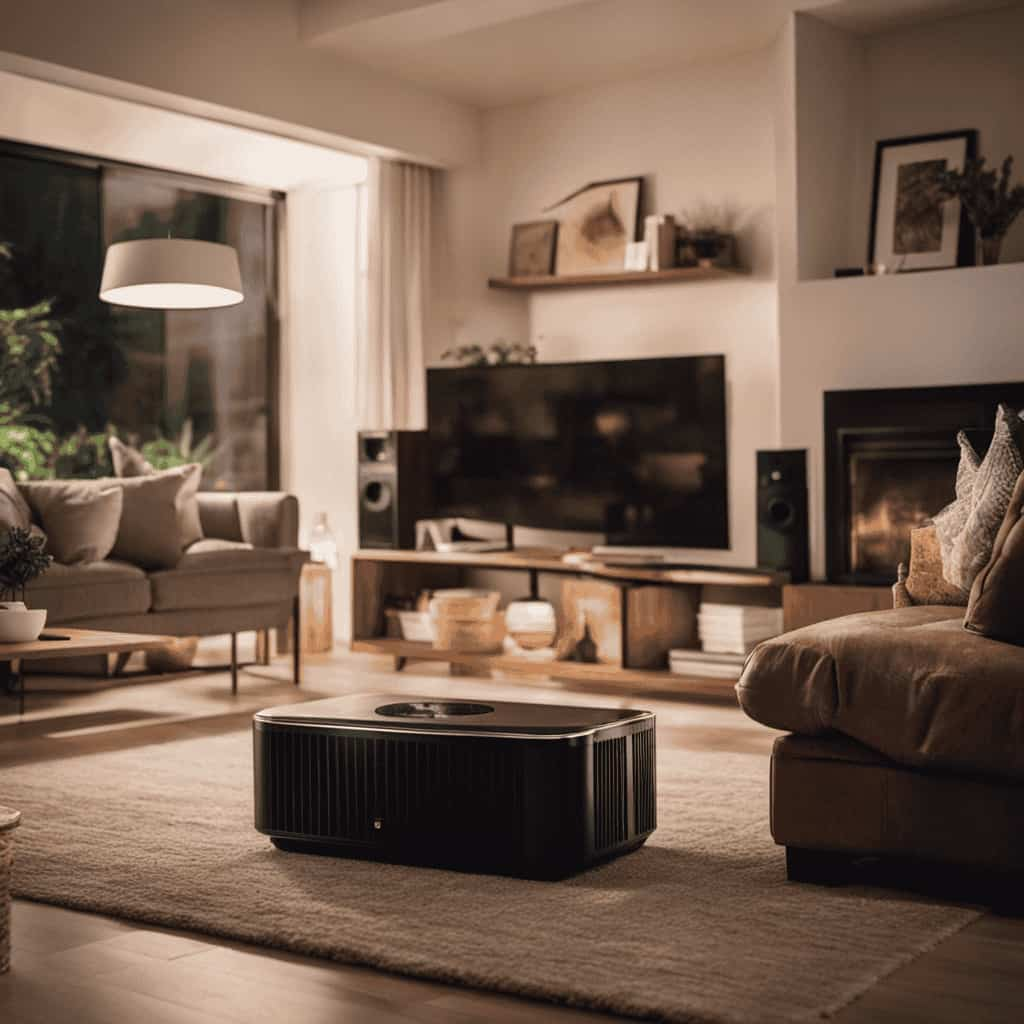
-
Seal air leaks: Identify and seal any gaps or cracks in windows, doors, and walls to prevent drafts and heat loss.
-
Insulate ducts: Properly insulating ducts minimizes heat loss during distribution, ensuring that warm air reaches its intended destination.
Frequently Asked Questions
Are Heat Pumps Suitable for All Types of Homes, Including Older or Historic Houses?
Heat pumps can be suitable for older or historic homes. However, heat pump installation in older houses may require additional considerations due to factors such as insulation, ductwork, and electrical capacity. It is important to consult with a professional to determine the best solution.
Can Heat Pumps Be Used as a Primary Heating Source in Extremely Cold Climates?
Yes, heat pumps can be used as a primary heating source in extremely cold climates. Although heat pump efficiency may decrease in very low temperatures, there are alternative heating options available for optimal comfort.
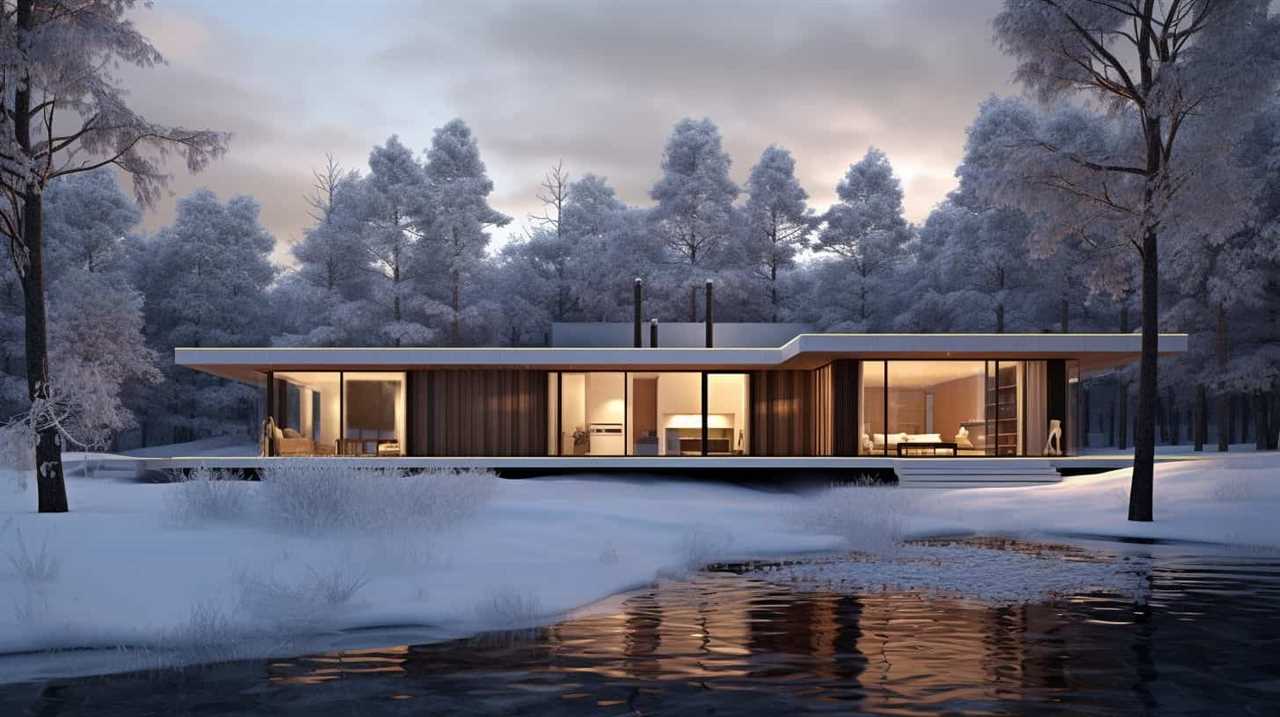
How Long Does the Installation Process Typically Take for a Heat Pump System?
The installation time for a heat pump system varies depending on factors such as the size of the system and the complexity of the installation. It is important to ensure heat pump compatibility with your home’s existing heating system.
Are There Any Government Incentives or Tax Credits Available for Installing a Heat Pump?
There are government incentives and tax credits available for installing a heat pump. These incentives and credits can help offset the cost of installation and make it more affordable for homeowners.
Can a Heat Pump Be Used for Both Heating and Cooling Purposes in a Home?
Yes, a heat pump can be used for both heating and cooling purposes in a home. It is a versatile system that can provide energy-efficient heating in the winter and cooling in the summer, resulting in potential energy savings. Regular heat pump maintenance is crucial for optimal performance.
Conclusion
In conclusion, heat pumps offer an energy-efficient solution for home heating. With their ability to transfer heat from one place to another, they provide both warmth and savings on your energy bills.
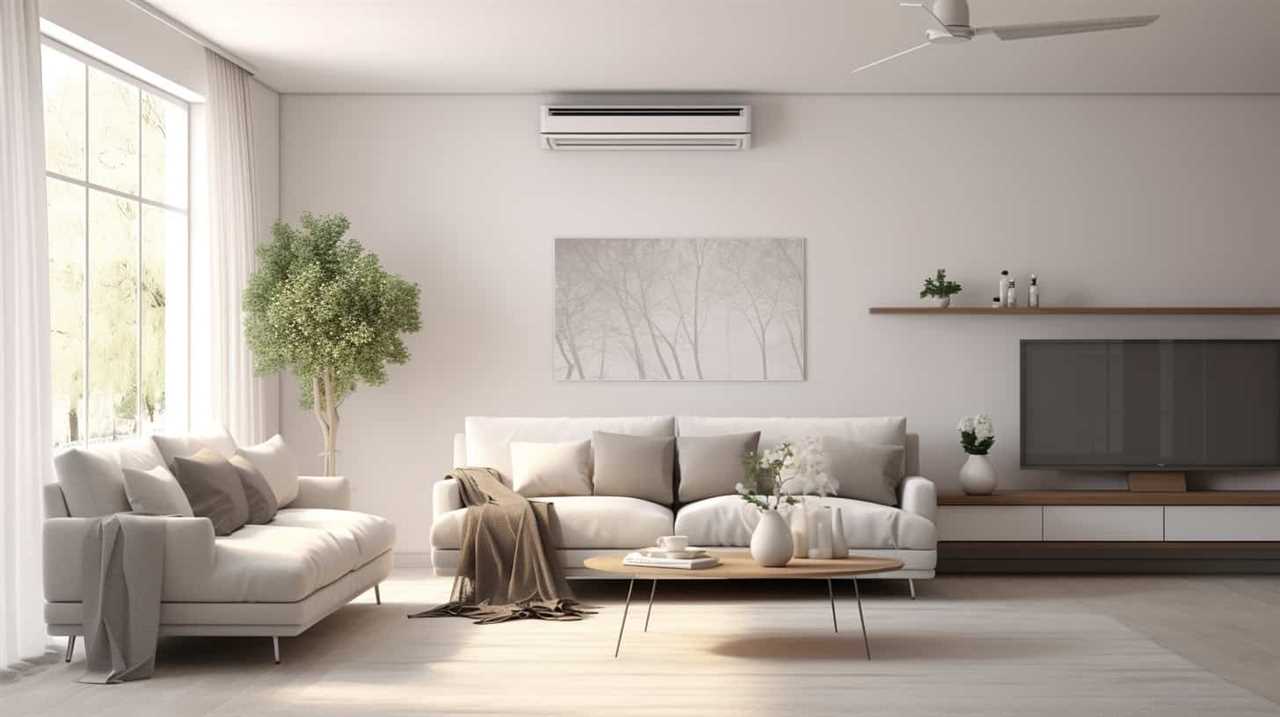
By considering factors such as the type of heat pump and proper installation and maintenance, you can maximize their efficiency.
So, why not embrace the power of heat pumps to keep your home cozy and your wallet happy?

